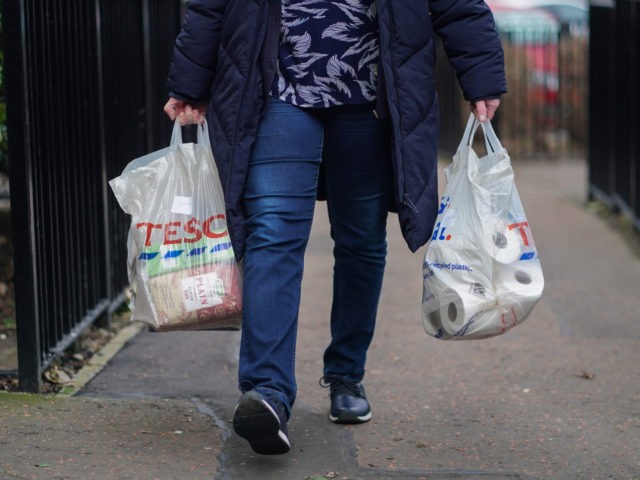Households in Britain are facing the worst decline in their real income in decades, as energy prices cause inflation to soar.
A report published on Tuesday warns UK households will see the worst decline in real income since the 1970s, largely thanks to soaring energy bills.
Moscow’s ongoing war in Ukraine — along with concomitant sanctions implemented on Russia by the west — have resulted in the already rising cost of fuels like natural gas and motor spirit (petrol / gasoline) to spike in price, with fears that even worse will likely follow as actual constriction of supply kicks in.
According to the report by the Resolution Foundation think-tank, things were already looking bad before the crisis in Ukraine took hold, with the group previously forecasting inflation to hit 7.3 per cent in April.
However, the organisation now thinks the UK will face inflation of over 8 per cent in the coming months as a result of the ongoing war.
“The crisis in Ukraine has increased both the scale of price rises, but also the degree of uncertainty about their levels and duration,” the report reads.
Europe’s Russian Gas Addiction Under Pressure as Kremlin Threatens to Cut Supply https://t.co/wD1qX6SorI
— Breitbart London (@BreitbartLondon) March 8, 2022
“Considering the impact on petrol and energy costs alone leads us to estimate the monthly peak of inflation will now exceed 8 per cent this spring, and could rival the 8.4 per cent reached in 1991 (in turn the highest inflation since 1982),” it continues.
This colossal increase in inflation is predicted to have serious knock-on effects for British citizens, with the think-tank predicting the greatest decline in real income in years.
“High inflation will make falling real household incomes the defining economic feature of 2022,” the report claims. “Inflation of 7.6 per cent in 2022-23 would leave the typical real household income for non-pensioners 4 per cent – or £1,000 – lower than in 2021-22.”
“This is a scale of fall only previously seen around the recessions of the financial crisis, early 1980s and mid-1970s.”
The claims were underlined by Tory MP Robert Jenrick, one-time housing minister, who told British television that “We could be looking at an energy crisis unrivalled since the 1970s and the forecast that we saw today suggests that household incomes could fall by a larger percentage this year that any time since records began in 1955”, per the Daily Mail.
While the MP declared his fealty to Boris Johnson’s flagship “Net zero” pledge to decarbonise the economy, Jenrick nevertheless continued: “You’ve now clearly got to wake up and balance net zero with other competing demands. Energy security and the pounds in the pockets of people in this country.”
Also cited in the Mail report was the claims of the Centre for Economics and Business Research, which suggested the Ukraine war and the economic impacts that come with it would see household bills rise by over £1,250 a year.
‘Global Food Crisis’ Ukraine War Will Have ‘Catastrophic’ Effect on Global Food Supply – Agri Org https://t.co/UcIXowiQVA
— Breitbart London (@BreitbartLondon) March 8, 2022
Those in the UK are not the only people feeling the pinch of energy inflation.
Germany has seen the price of both petrol and diesel spike to over €2 a litre — or roughly $8.27 per gallon — with the price of oil continuing to rise.
Ireland, meanwhile, has also seen the price on some petrol pumps rise beyond the €2 mark for petrol, with some fearing that the worst is yet to come regarding the price of fuel.
“Paying €2 a litre has become a type of psychological line in the sand,” the Irish Times reports a spokesman from the AA motoring association as saying. “For an average car, travelling 17,000km [~10,563 miles] a year, you are paying approximately €800 [~$872] more a year now than you were two years ago.”
“Given what is happening in Ukraine, the potential is there for the price to continue to escalate,” the spokesman also noted.
While the price of fuel is hitting the headlines across Europe, food security is another creeping cause for concern.
Europe’s agri-food sector is heavily reliant on supplies from both Russia and Ukraine, with a vast amount of animal feed, fertilizer and grains being sourced from the two countries.
However, with the ongoing conflict, these supply chains have been heavily disrupted for the short-to-medium term.
“Half the world’s population gets food as a result of fertilisers… and if that’s removed from the field for some crops, [the yield] will drop by 50%,” said Svein Tore Holsether, who heads up one of the world’s leading fertiliser companies.
“For me, it’s not whether we are moving into a global food crisis – it’s how large the crisis will be,” Holsether went on to say.

COMMENTS
Please let us know if you're having issues with commenting.